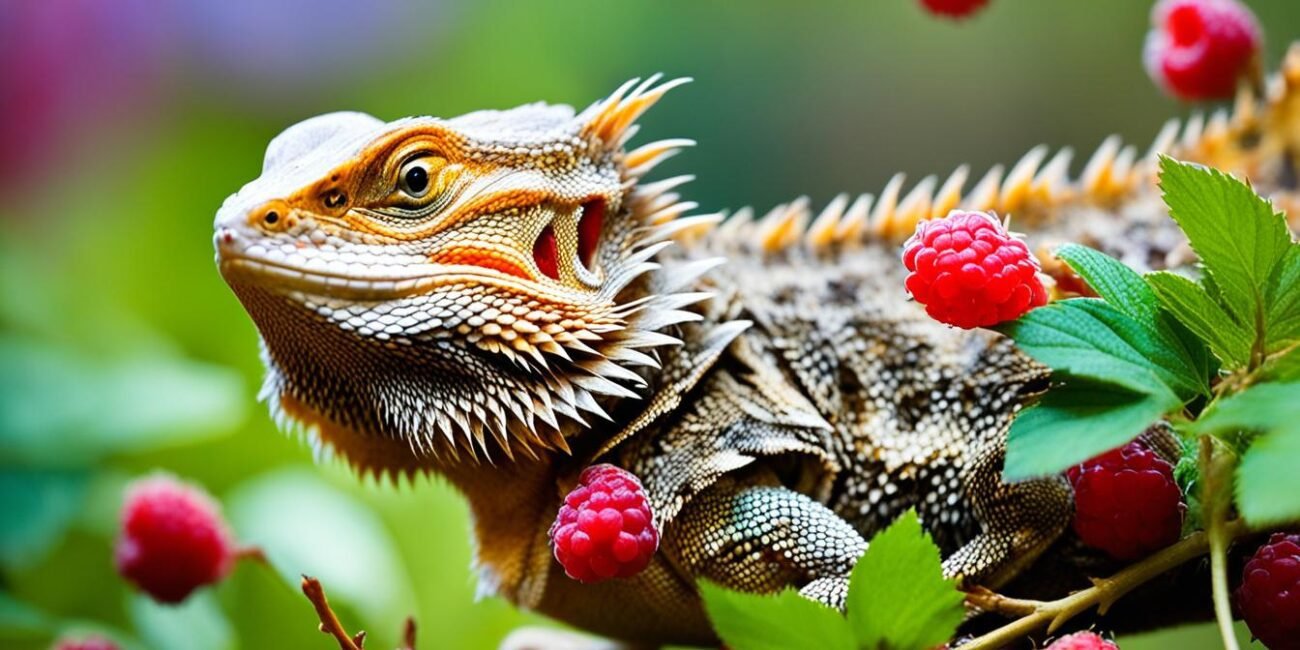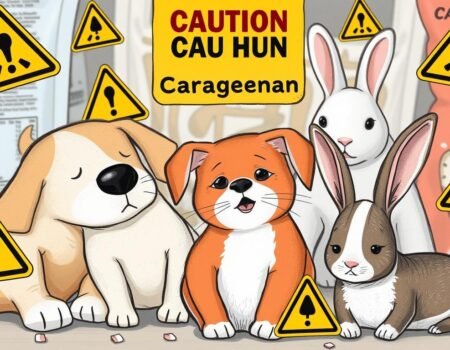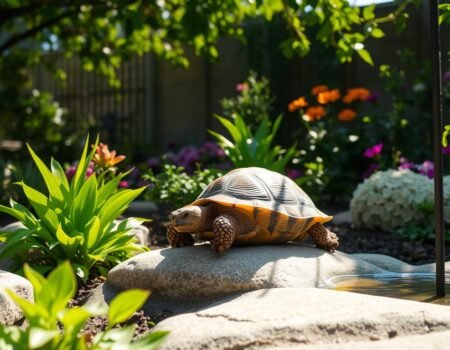“Let food be thy medicine and medicine be thy food.” – Hippocrates
Welcome to an exploration of a fascinating question: Can bearded dragons eat raspberries? As a proud owner of these incredible reptiles, I understand the importance of providing them with a balanced and nutritious diet. Raspberries may seem like an unexpected addition to their menu, but they can offer surprising benefits when fed in moderation.
Bearded dragons are natural omnivores, and while their diet should primarily consist of protein, greens, fruits, and vegetables, they can indeed enjoy the occasional raspberry treat. However, it’s crucial to understand the guidelines and potential risks associated with feeding them this delectable fruit.
Key Takeaways:
- Bearded dragons can eat raspberries as part of a varied diet, but in moderation.
- Raspberries offer health benefits such as vitamins, minerals, fiber, and antioxidants.
- Feeding raspberries too frequently or in large quantities can lead to health issues.
- Proper preparation and portion control are essential when feeding raspberries to bearded dragons.
- Raspberry seeds and leaves are safe for bearded dragons to consume.
The Benefits Of Feeding Them Raspberries
Raspberries offer numerous health benefits for bearded dragons. They are rich in vitamins, minerals, and antioxidants, making them a valuable addition to their diet.
Vitamins: Raspberries are packed with vitamins that support the overall health and well-being of bearded dragons. They contain:
- Vitamin C: Supports tissue repair, organ development, and boosts the immune system.
- Vitamin K: Promotes blood clotting and healthy bone development.
- Vitamin E: Protects cells from damage and promotes healthy cellular function.
Minerals: Bearded dragons require a variety of minerals to maintain their bodily functions. Raspberries provide:
- Manganese: Essential for metabolism and enzyme function.
- Magnesium: Helps regulate blood sugar levels and supports nerve function.
- Iron: Necessary for oxygen transportation and organ health.
- Potassium: Aids in nerve function and regulates blood pressure.
Antioxidants: Raspberries are rich in antioxidants, which help protect bearded dragons’ cells from damage caused by free radicals. Antioxidants play a crucial role in maintaining overall health and reducing the risk of age-related diseases.
Hydration: Bearded dragons need proper hydration to support their bodily functions. Raspberries contain about 87% water, making them a hydrating snack that can help prevent dehydration.
| Vitamins | Minerals | Antioxidants | Hydration |
|---|---|---|---|
| Vitamin C | Manganese | Antioxidants | Hydration |
| Vitamin K | Magnesium | ||
| Vitamin E | Iron | ||
| Potassium |
Providing raspberries as part of a balanced diet can contribute to the overall health and well-being of your bearded dragon.
However, it’s important to remember that raspberries should be fed in moderation. While they offer health benefits, they should not replace the primary components of a bearded dragon’s diet, such as protein, greens, and vegetables. It’s crucial to maintain a varied diet to ensure proper nutrition and digestive health for your bearded dragon.
How Often Should Bearded Dragons Eat Raspberries?
When it comes to feeding bearded dragons raspberries, moderation is key. While raspberries offer numerous health benefits, it’s important to avoid overfeeding them to your reptile friend. A bearded dragon’s diet should primarily consist of protein, greens, and vegetables, with fruits playing a smaller role. Raspberries can be offered as an occasional treat, providing one or two berries every other week. This frequency ensures that your bearded dragon receives the nutritional benefits of raspberries without the associated health risks.
Raspberries contain oxalates, which, in excess, can bind with calcium and hinder its absorption in the body. This can lead to serious bone disorders like metabolic bone disease. Additionally, raspberries have a higher phosphorus to calcium ratio, potentially causing a calcium deficit. Overconsumption of raspberries can also result in digestive issues and weight gain due to their higher sugar and water content.
To maintain the overall health of your bearded dragon, it’s crucial to strike a balance in their diet. While raspberries can be a tasty addition, they should not become the main focus. Instead, prioritize protein, greens, and vegetables. These provide the necessary nutrients and ensure a well-rounded diet for your bearded dragon’s optimal health.
Recommended Portion Size for Raspberries:
When offering raspberries to your bearded dragon, it’s important to provide an appropriate portion size. A suitable serving consists of one or two raspberries, depending on the size of the fruit. Be mindful of the size of the bearded dragon’s mouth and adjust the berry size accordingly. Chopping raspberries into small, bite-sized pieces can help prevent choking hazards and facilitate easy consumption. Remember, portion control is crucial to prevent overfeeding and potential health risks associated with excessive raspberry consumption.
Health Risks of Overfeeding Raspberries to Bearded Dragons:
Overfeeding raspberries to bearded dragons can pose significant health risks. As mentioned earlier, the oxalates present in raspberries can hinder calcium absorption, leading to bone disorders. Additionally, the imbalanced phosphorus to calcium ratio in raspberries can further contribute to a calcium deficit. The excess sugar and water intake from raspberries can also result in digestive issues and unwanted weight gain in bearded dragons. To maintain their overall well-being, it’s essential to feed raspberries in moderation and prioritize a balanced diet.
| Frequency of Feeding Raspberries | Recommended Portion Size | Health Risks |
|---|---|---|
| Every other week as an occasional treat | One or two raspberries | Oxalate binding with calcium, imbalanced phosphorus to calcium ratio, digestive issues, weight gain |
How To Feed Raspberries To Your Bearded Dragon
Properly preparing raspberries for your bearded dragon’s diet is essential to ensure their health and wellbeing. Follow these guidelines to incorporate fresh raspberries into your bearded dragon’s diet:
- Choose fresh, raw raspberries: Opt for fresh organic raspberries whenever possible to avoid chemical-based pesticides and fertilizers. Avoid cooked or processed raspberries as they can decrease the nutritional value.
- Thaw frozen raspberries: If using frozen raspberries, ensure they are completely thawed to prevent choking hazards.
- Inspect and wash the raspberries: Before feeding, inspect the raspberries and discard any that are overripe or damaged. Wash the raspberries thoroughly to remove debris and residue.
- Chop into small pieces: Chop the raspberries into small, bite-sized pieces that are easy for your bearded dragon to swallow.
- Consider serving options: You can offer the raspberries as part of a mix with greens and vegetables or as standalone treats.
- Monitor your bearded dragon’s health: After introducing raspberries into their diet, closely monitor your bearded dragon for any adverse reactions. Keep an eye on their stool to ensure they have no digestive issues.
By following these proper preparation techniques and practicing portion control, you can safely incorporate raspberries into your bearded dragon’s diet, providing them with a nutritious and varied menu.
Can Bearded Dragons Have Raspberry Seeds?
Bearded dragons can safely consume raspberry seeds without any issues. The seeds are tiny and usually pass through the digestive system without causing harm. A single raspberry can contain up to 120 seeds, so it’s virtually impossible to avoid them completely. Raspberry seeds form in the small juice pockets of the fruit, and while they are considered safe, it’s important to provide raspberries in moderation to avoid overfeeding. It’s worth noting that raspberry seeds contribute minimal nutritional value to the diet of bearded dragons.
What About The Leaves?
Raspberry leaves can also be safely consumed by bearded dragons in moderation. While they should not replace standard greens in their diet, raspberry leaves can be incorporated as occasional additions.
The leaves are relatively soft and may provide a satisfying crunch for bearded dragons. They are also known to be rich in nutrients. Raspberry leaves have a long history of medicinal use and are often brewed for teas and other drinks.
If you have access to a raspberry bush, you can offer the leaves to your bearded dragon as a part of their meals. However, it’s important to provide a balanced diet and not rely solely on raspberry leaves for nutrition.
Nutritional Value of Raspberry Leaves for Bearded Dragons
Raspberry leaves offer various nutritional benefits for bearded dragons. They are a good source of vitamins, including vitamin C, which supports the immune system and promotes tissue repair. Additionally, raspberry leaves contain minerals such as calcium, magnesium, and manganese, which are essential for bone health, muscle function, and overall well-being.
Furthermore, raspberry leaves are rich in antioxidants that help protect against oxidative damage and inflammation. These antioxidants contribute to the overall health and longevity of bearded dragons.
It’s important to note that while raspberry leaves can be a nutritious addition to a bearded dragon’s diet, they should be offered in moderation alongside a variety of other leafy greens and vegetables to ensure a well-rounded and balanced meal plan.
Can You Feed Your Bearded Dragon Raspberry Jam?
Feeding raspberry jam to bearded dragons, dangers of processed raspberry products for bearded dragons, importance of natural and fresh fruits for bearded dragons
When it comes to feeding your bearded dragon, it’s important to avoid raspberry jam or any other processed raspberry products. Although jams may seem like a tasty treat, they can be harmful to the health of your pet.
Most jams contain added sugar, which can lead to weight gain and potential dental issues for bearded dragons. They already get plenty of sweetness from fresh raspberries, so there’s no need to introduce additional sugars into their diet.
Processed raspberry products like jam also lack the nutritional content and value of fresh fruits. The heat used in processing destroys essential vitamins and minerals, making the jam nutritionally useless for your bearded dragon.
Stick to fresh, natural raspberries as treats or occasional additions to your bearded dragon’s diet. These provide the best nutritional benefits and ensure your pet stays healthy and happy.
Conclusion
In conclusion, raspberries can be a safe and beneficial addition to a bearded dragon’s diet. These delicious fruits offer a variety of health benefits, including vitamins, minerals, fiber, and antioxidants. However, it’s important to feed raspberries in moderation and as part of a balanced diet.
Overfeeding raspberries can lead to potential health issues for bearded dragons. Raspberries contain oxalates, which can bind with calcium in the body and lead to issues like metabolic bone disease. Additionally, the imbalanced calcium-phosphorus ratio and high sugar and water content in raspberries can cause digestive issues and weight gain if consumed excessively.
To incorporate raspberries into a bearded dragon’s diet, it’s crucial to practice proper preparation and portion control. Choose fresh, organic raspberries and wash them thoroughly before offering them to your pet. Chop the raspberries into small, bite-sized pieces for easy consumption. Remember to monitor your bearded dragon’s health and stool for any signs of digestive issues.
Avoid feeding processed raspberry products like jam to your bearded dragon, as they lack the nutritional value of fresh fruits. Stick to natural, fresh raspberries as occasional treats or additions to their meals.
By following these guidelines, you can ensure the safe and enjoyable incorporation of raspberries into your bearded dragon’s diet. Remember, it’s always best to consult with a veterinarian for personalized advice and recommendations regarding your pet’s dietary needs.
FAQ
Can bearded dragons eat raspberries?
Yes, bearded dragons can eat raspberries as part of a varied diet.
What are the benefits of feeding raspberries to bearded dragons?
Raspberries provide vitamins, minerals, fiber, and antioxidants that support overall health, digestion, and hydration.
How often should bearded dragons eat raspberries?
Bearded dragons should be fed raspberries as an occasional treat, offering one or two every other week.
How should I feed raspberries to my bearded dragon?
Wash and chop fresh organic raspberries into small, bite-sized pieces before offering them to your bearded dragon. Monitor their health and stools for any adverse reactions.
Can bearded dragons have raspberry seeds?
Yes, bearded dragons can safely consume raspberry seeds without any issues.
Can I feed raspberry leaves to my bearded dragon?
Yes, raspberry leaves can be safely consumed by bearded dragons as occasional additions to their meals.
Is it safe to feed my bearded dragon raspberry jam?
No, it’s important to avoid feeding bearded dragons raspberry jam or other processed raspberry products, as they lack nutritional value and may contain added sugar.










No Comment! Be the first one.